Care for all components of a vehicle – however mundane they might appear – is essential for fleets, which means the likes of tyres should be respected. By Matthew MacConnell.

While they’re easily overlooked, good tyres are essential to keep a van fleet running smoothly. The less time spent at the side of the road, or in a garage, means more productivity, healthier profit and happier fleet operators. With more fleets transitioning to EVs, subjects such as driving range, load and charging become the dominant topics of conversation. As a result, tyres may not always be factored in but, if a fleet chooses its tyres carefully, both money and time could be saved.
There are few tyres available that give an increase in LCV range and reduce pollution, but Enso tyres claim to offer both.
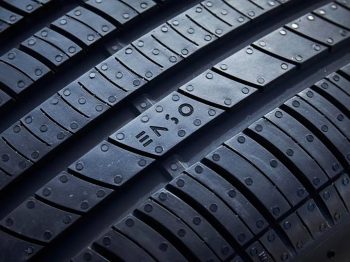
“Enso tyres are precisely optimised for electric vans to enhance durability, extend the range by up to 10% and reduce particulate pollution by up to 35%,” says Enso CEO Gunnlaugur Erlendsson, who has a refreshing approach to the business.
“As the only company providing low-emission tyres for taxi and van fleets, Enso’s ethos is to make fewer tyres and make them last longer. It’s simple maths: doubling tyre durability means reducing pollution by half. Imagine the impact if major delivery fleets such as Amazon or UPS switched to Enso tyres tomorrow. The benefits would be substantial – better, more affordable tyres, reduced pollution and total cost of ownership savings.”
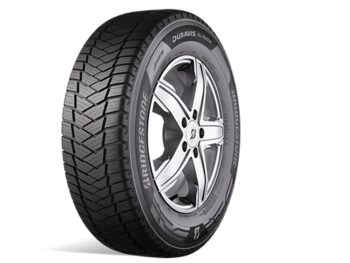
At the beginning of 2023, Bridgestone launched its new EV-ready Duravis van tyre, which achieves the highest EU rating for wet grip. Bridgestone claims that Duravis is also winter-ready and boasts the three-peak mountain snowflake (3PMSF) symbol.
With larger fleets, it can be harder for fleet managers to keep up with tyre maintenance, but Bridgestone offers the Fleetcare Go Plan – a subscription-based plan that helps gain insights about fleet status, services delivered, invoices received and contract progress via a personalised portal.
With electric vans having instant torque and weighing around 20-30% more than their diesel counterparts, tyres must provide adequate grip, which could result in more tyre wear.
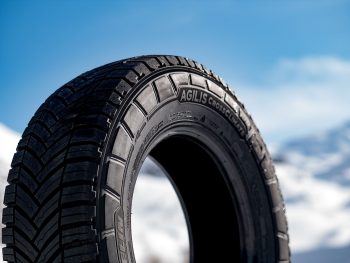
Michelin offers the Agilis CrossClimate, an EV-ready all-season tyre. Currently, run-flat tyre availability for EV LCVs is scarce but Michelin is working on a prototype called the Uptis airless tyre, which is considered a key step towards the development of a fully sustainable Michelin tyre by 2050.
For fleets with ICE vehicles, the tyre market opens up and there’s plenty of choice.
Continental offers its VanContact Ultra and VanContact A/S Ultra.
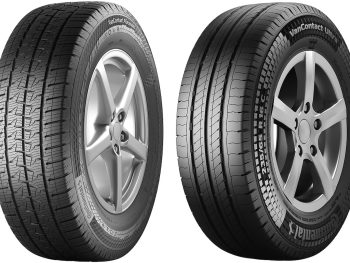
These van-specific radials have been fitted with a rubber compound that reduces rolling resistance, helping to cut fuel costs while reducing CO2 emissions. An all-season tyre, the VanContact Ultra A/S uses small bars in the tread grooves known as “snow traps” to hold the snow in and improve traction. Meanwhile, for fleets who operate in urban environments, kerbing can lead to tyre damage, but Continental has adopted a ‘brick’ pattern which protects the tyre sidewall. The current size for both tyres is 15 to 17 inches, although Continental is continuing to roll out further sizes.
The company’s VanContact Eco is designed for energy-efficient driving and can be fitted to EV LCVs. It, too, boasts low rolling resistance, which helps improve energy consumption.
Tis the season
All-season tyres are becoming increasingly popular as fleets won’t need to store summer or winter tyres in warehouses or have downtime when it comes to changing tyres – a process that can be incredibly daunting in larger fleets.
“Selecting the correct load-rated tyres for light commercial vehicles is an important choice, which directly impacts safety, performance and overall durability,” states Peter Cross, commercial manager, Davanti Tyres.
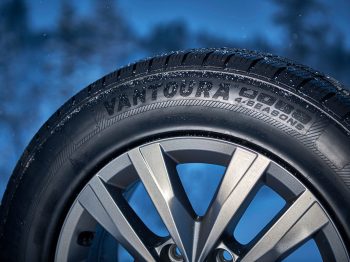
“However, with a vast range of options, it can be tricky to know what is right for your fleet. Nevertheless, one example that can suit different LCVs all year round is Davanti’s Vantoura 4-Seasons. It offers enhanced all-round safety features plus reduced waste thanks to the elimination of unnecessary tyre changes.”
Another company offering all-season van tyres is Landsail. Its 4Seasons van tyre helps improve fuel efficiency and gives a blend of handling, comfort and longevity.
Safety in numbers
While good tyres help keep an LCV safe and roadworthy, accidents happen and fleet managers should have practical accident management procedures in place. Having an excellent insurance policy through a reputable company helps minimise any headaches and cut any unexpected costs.
Of course, accidents can range from road traffic collisions (RTCs) to fires. Potential heinous acts such as theft or vandalism shouldn’t be overlooked either.
Claims Management & Adjusting (CMA) is the UK’s oldest motor insurance loss adjuster, a company that knows the right questions to ask when fleets are presented with excessive invoices after a mishap.

“Accidents generally fall into one of three categories – collision, fire or spill,” explains CMA’s managing director Phillip Swift. “Collisions can range from minor damage to just the van itself – with costs in the hundreds of pounds – up to serious damage to infrastructure such as motorway gantries and parapets, with costs in the tens or even hundreds of thousands.”
Fires are known to destroy vehicles and are often accompanied by large claims such as scorched roads or surrounding damage. Spill-related incidents might involve the van’s fuel, or the shedding of a load, again with the high risk of a resurfacing claim.
“Whatever the issue, careful management and smart action on the part of the driver will help keep costs to a minimum,” says Swift. “Ideally, drivers should have a specified point of contact (usually the fleet manager) to advise, oversee and keep a log of events. Keep calm, recognise that accidents will happen and make sure you react in the right way.
“Following this simple advice can make a massive difference to the final bill,” he reckons. “For example, in 2012, a mile-long spill on the Forth Bridge saw the authorities act immediately and keep cleansing costs under £1,000. A few years later, a similar much shorter spill on the M20 saw costs exceed £50,000.”
CMA is frequently provided with comprehensive maintenance records when acting for fleets. This can demonstrate care and attention and help reduce or even negate payments.
According to fleet management and telematics solutions company Webfleet, insurers recognise that an ongoing commitment to road safety over a sustained period is likely to lead to a reduction in collision rates and claims costs. Due to this situation, they tend to look at businesses that have robust and sustainable road risk management policies in place.
Prolonged and tailored coaching that meets the individual driver’s requirements may be a better solution over one-off or ad hoc training sessions, which may only result in short-term improvement. Insights offered by telematics software can help fleet managers drill into causes of unsafe practices and track improvements.
Webfleet’s fleet management solution offers a driver score, which is based on key performance indicators such as speeding, harsh braking and steering. Webfleet OptiDrive scores – currently implemented on a 700-stong Halfords van fleet – can be used to incentivise and reward safe driving while helping those who fall below a set standard to improve.
“With such a large fleet, it’s critical that our technicians out on the road are driving responsibly and respectably at all times,” says Karl Baker, Halfords Mobile Expert operations director. “We are also aiming to cut fuel spend by reducing idling time and to keep a lid on insurance premiums and excesses by sharing demonstrable proof of safer driving with our insurers.”

